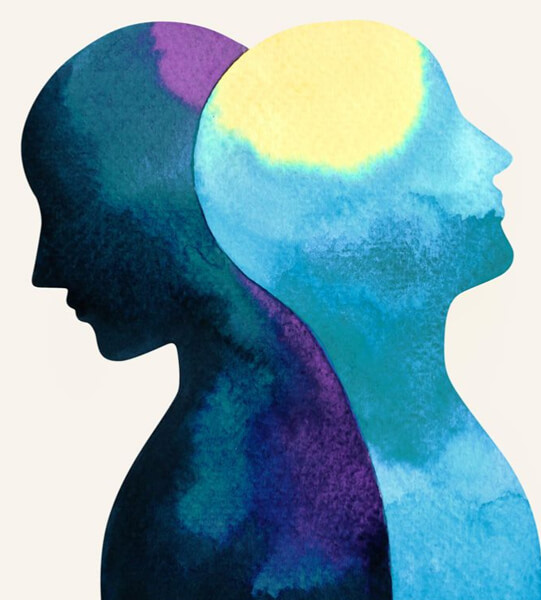
Bipolar disorder is a mental disorder that is characterized by fluctuations of extreme moods .As the name suggest bi(two ) poles ; alternating episodes of extremely low mood (Depressive episode )to extremely elated,euphoric or irritable (Manic episode) or less severe form of it ( Hypomaic episode )
These mood swings can affect energy, activity level, libido,sleep , judgment,planning and behaviour of patient affecting personal and occupational life.
These episodes can occur rarely or many times in a single year.
Prevalence : It can happen at any age but more likely to occur at teenage around 18 years of age to 50 years. .

Bipolar disorder Depression has symptoms just like simple depression(low mood , loss of pleasurable activities, inability to focus, loss of libido, disturbed appetite, feeling of guilt, pessimism,hopelessness or even suicidal ideation . Distinct feature is this it always has sudden and severe onset plus family hx of Bipolar Affective Disorder.
Manic and hypomanic episodes have similar set of symptoms but less severe in the latter. Manic Episode includes 3 symptoms for a period of atleast one week or less if only hospitalization is required.
1.Most part of the day ,elated ,expansive or irritable mood
2.Increased energy levels or activity , unable to sit
3.fasle exaggerated sense of self for example; being rich or special
4.Decreased need for sleep ie; feeling rested after 2 hrs of sleep
5.increased talkativenessie; unable to stop talking
6.Racing thoughts
7.poor decision making; foolish business investments , buying sprees
Or sexual disincreations
8 Occupational or personal and interpersonal decline
Or if needs just hospitalization for unrestrained physical energy.
It has similar symptoms but intensity is less and also doesn’t cause decline at work or personal relations.
1.Genetics.If a first degree family member (parent or sibling) has bipolar disorder ,risk increases significantly.
2.Biological changes in brain; certain areas of brain especially dealing with planning such as frontal cortex ,have structural changes.
1. First-degree relatives
2. Sudden or continuous level of high stress
3. Drug or Alcohol use.
BIPOLAR DISORDER IS A LIFELONG ILLNESS YOU NEED REGULAR CHECKUPS AND TREATMENT
1. Mood Stabilizers are given to manage your mood such a lithium, Valproic acid etc
2. Antispychoatics: if patient develops psychoatoc features ie; false beliefs for example feeling having super powers etc Antispychoatics are given for such patients .
3. Antidepressant are given to help manage depression. But given with precaution as it can induce mania like .Also have lower efficacy in Bipolar Depression.
4. Anti-anxiety medications. Benzodiazepines are given to help relieving anxiety and improve sleep cycle in both bipolar and manic symptoms.
5.Substance Abuse tx; if patient is having comorbid drug abuse , it has to be addressed as well.To manage withdrawals of drugs and decrease the risk of relapse.
6.Hospitalization; if patient’s energy levels are so high that can be exhausting and pose life threat.
7.ElectroConvulsive Therapy; indicated in cases of severe suicidal patients (having refusal to eat or drink) in patients of Bipolar depression .
Also indicated for manic patients having increased energy level or severe sleep depreviation which can be exhausting and consequently life threatening for the patient.
Psychotherapy is also must with medications to
1. educating patient regarding illness causes,symptoms and orientation about treatment plan
2.stress coping,different techniques for problem solving and alleviating stress.
3.relapse prevention which focus on preventing triggers and long term adherence to the treatment plan
4.Social rhythm therapy to avoid long socialization with people ,
5.sleep therapy to prevent disturbance of sleep cycle.
1.Sleep disturbance : poor sleep in case of Bipolar depression or decreased need for sleep in case of manic phase.
2.Increase planning or pacing which is unable to rest .
3.Mood fluctuations .
These can be early signs of relapse or start of Bipolar Disorder.Focusing on it ,we can significantly reduce the duration of illness and also can diagnose early
1. Bipolar patients have to take medication for life Yes , it’s life long illness but medicine are adjusted with regular visits and even are tapered off completely depending on the nature and severity of symptoms.
2.Bipolar patients cannot work at job or business .As they made foolish business deals or spent extravagantly during illness but this doesn’t mean they cannot do anthing .
3.Bipolar Disorder just means mood swings which infact far extreme mood disorder which needs treatment .
4.its an excuse for erratic behaviour but infact it’s a disease just like diabetes or hypertension.
5.Patients can control this Disorder with sheer willpower but just like you cannot snap out of broken leg .you cannot just deal with willpower.
6.people having bipolar Disorder are dangerous and must be avoided .infact they are no more dangerous than people using drugs or having anger issues .
1. Sometimes patients presenting with psychoatic symptoms can have religious connotations such as calling themselves Saints or having special powers (if i put a knife in my belly ,it won’t hurt me) or calling themselves religious figures, Imam mehdi etc which can put patients life and family at risk.So confidentiality is most important, family should try to keep such beliefs expressed by patient to themselves and only to be shared with psychiatrist.
2. Patients should be monitored not to involve in triggering environment which can vary from person to person. patient with history of increase in religiosity must not go to Milaads etc
3. Long term side effect of drugs include obesity or disturbance in other bodily structure eg; hair loss. Most of patients leave taking medications or family tell them to stop taking without even consulting the treating psychiatrist.
These can be addressed by regular checkups and routine lab tests which are integral part of the long term treatment.
1.Just like any other mental disorder a lot of stigma is attached to it .These people can no longer live a healthy life or start a family.With proper treatment ,they can again live a normal and healthy life.
2.If one family member is having the disorder it means everyone else would get it.
This is completely wrong ,yes incidence increases to some extent but doesn’t mean they would definitely get it.Rather its likelihood depends on poor stress coping, drug use and abuse.etc
Best psychiatrist in Lahore,
387-E Khayaban-e-Firdousi, near Allahu chowk, Block E Phase 1 Johar Town, Lahore, Punjab 54782
Days and Timings:
Monday 03:00pm to 10:00pm
Wednesday 03:00pm to 10:00pm
Thursday 03:00pm to 10:00pm
Friday 03:00pm to 10:00pm
Sunday 03:00pm to 10:00pm
For appointment: 0321 1439754
CENTRAL HOSPITAL, GUJRANWALA
Days and Timings:
Saturday 02:00pm to 09:30pm
For appointment:
055-4277072
055-4277073
055-4277074
ONLINE VIDEO CONSULTATION
For appointment: +92 321 1439754